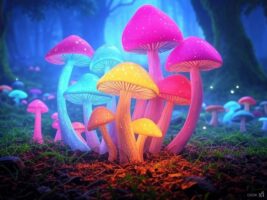Psilocybin
Table of contents:
- Psilocybin Mushrooms Effects: Beyond the Hallucinations
- Psilocybin Therapy: A Journey into Self
- Psilocybin Microdosing Benefits: Subtle Shifts in Daily Life
- Psilocybin Legal Status: A Global Mosaic
- References



Psilocybin Mushrooms Effects: Beyond the Hallucinations
While the hallucinogenic effects of psilocybin are well-documented, less known is how these mushrooms can influence neuroplasticity. Psilocybin has been observed to promote the growth of new neural connections, a process akin to ‘spring cleaning’ for the brain. This neuroplasticity isn’t just about creating new pathways but also about pruning unnecessary ones, potentially leading to a more efficient cognitive landscape. Moreover, psilocybin can enhance the experience of music, not merely in perception but in how it might evoke deeper emotional responses, possibly due to increased connectivity in auditory processing areas of the brain.
Biology & Hallucinogenic effects of psilocybin:
Ingestion and Conversion
Psilocybin is ingested either through eating mushrooms or other forms. Once ingested, it is quickly metabolized in the body to psilocin, its active metabolite. This conversion happens primarily in the liver by dephosphorylation, where the phosphate group is removed from psilocybin.
Brain Penetration
Psilocin, being more lipid-soluble than psilocybin, readily crosses the blood-brain barrier. This allows it to enter the central nervous system where it can exert its psychoactive effects.
Serotonin Receptors Interaction
Psilocin primarily acts as an agonist at serotonin receptors, specifically targeting the 5-HT2A receptors. These receptors are widely distributed in the brain, particularly in areas like the prefrontal cortex, which is involved in cognitive processes, perception, and mood regulation. The activation of 5-HT2A receptors by psilocin leads to:
- Altered Sensory Perception: This can include visual and auditory hallucinations, distortions in shape, size, movement, color, and sound.
- Cognitive Effects: Changes in thought patterns, including creative thinking, ego dissolution, and altered sense of time and self.
Neurotransmitter Modulation
Besides 5-HT2A, psilocin also interacts with other serotonin receptor subtypes like 5-HT1A, which can modulate mood, anxiety, and cognitive processes. It influences the release of other neurotransmitters like dopamine and glutamate, which are involved in reward, motivation, and learning, respectively. This interaction can lead to feelings of euphoria or changes in emotional states.
Disruption of Default Mode Network (DMN)
The DMN is a set of brain regions more active when a person is at rest, involved in self-referential thoughts and autobiographical memory retrieval. Psilocin disrupts the normal activity of the DMN, which is thought to lead to:
- Ego Dissolution: A sense of losing one’s identity or merging with the environment.
- Enhanced Introspection: Allowing for profound psychological insights or spiritual experiences.
Neural Connectivity Changes
Psilocin is known to increase the connectivity between different brain regions that typically do not communicate much. This “hyperconnectivity” can:
- Facilitate Synesthesia: Where one sensory experience is perceived through another, like “seeing” sounds.
- Promote Novel Associations: Leading to creative insights or mystical experiences.
Neuroplasticity
There’s evidence suggesting that psilocin can promote neuroplasticity, the brain’s ability to form new neural connections. This might be one of the mechanisms behind its therapeutic effects, particularly in conditions like depression, where repetitive thought patterns need to be broken. New Neurology allows us to bypass old Neurology where the depressive patterns exist. The new Neurology is free from these and can be kep clean by changes in lifestyle that keep the new Neurology in good condition without the depressive qualities. The experience of a person with this new Neurology is less anxious and less prone to depression.
Psychological and Environmental Factors
The experience of hallucinations isn’t solely biological; psychological set (mindset) and setting (environment) significantly influence the nature and intensity of the psychedelic experience.
Psilocybin Therapy: A Journey into Self
Psilocybin therapy isn’t just about confronting and overcoming mental health issues; it’s about ‘redefining personal narratives’ and unearthing insights that aide personal development and the breaking of ‘negative patterns’ of thinking and behavior.
Psilocybin can facilitate a kind of ‘narrative restructuring’ where individuals can reframe traumatic or negative life events and day to day patterns of behavior in a new, more constructive light. This isn’t merely about recalling memories but experiencing them with a sense of distance and understanding, which can be profoundly healing.
Additionally, there’s emerging research on how psilocybin might help in managing the ‘default mode network’ of the brain, which is often hyperactive in depression, leading to rumination and negative self-reflection. It is actually this aspect in combination with Neuroplasticity which is key to Psilocybin Therapy. Our patterns of addiction and negative patterns of behavior are built into the Neurology of the Default Mode Network and by lowering its activity via the use of Psilocybin Mushrooms we actually allow other areas of the brain to form connections (new Neurology) and in doing so are able to move around blockages in our thoughts and behaviors.
Using Psilocybin in combination with Journaling can be very effective in shifting patterns of behavior from negative to positive. Once learned thoroughly the Psychedelics are not actually needed to facilitate this process but a very useful as ‘training wheels’ so to speak as we progress in our personal development path.
Psilocybin Microdosing Benefits: Subtle Shifts in Daily Life
Microdosing psilocybin is becoming a cultural phenomenon, but beyond the buzz, there are intriguing, less-discussed benefits. For instance, some users report enhanced sensory integration, where the brain seems to process sensory information in a more holistic, less fragmented way, potentially aiding those with sensory processing disorders. There’s anecdotal evidence suggesting microdosing can improve one’s relationship with time perception, making time feel more elastic, which can be particularly beneficial for those with time management issues or in creative fields where time can feel like a constraint. However, the science on these effects is still nascent, with much of what we “know” being based on personal testimonies rather than rigorous studies.
For the most part Micro Dosing is interesting because of the therapeutic offerings but once you are in a great place mentally there are others aspects which may become interesting to you.
Psilocybin Legal Status: A Global Mosaic
The legal status of psilocybin is a patchwork of contradictions and evolving laws. While it’s often seen as a Schedule I substance, in places like the Netherlands, there’s a nuanced acceptance where psilocybin truffles are sold in “smart shops” but not the mushrooms themselves. In Bhutan, psilocybin mushrooms are part of traditional medicine, highlighting a cultural acceptance not reflected in Western legal frameworks. This diversity in legal status underscores the global debate on whether psilocybin should be viewed through the lens of medicine or prohibition, with some countries like Portugal taking a harm reduction approach rather than outright criminalization.
Psilocybin Retreats are offered in places around the world where the legal status is conducive or its grey enough not to be particularly persecuted much by authorities. For example, Mexico and Jamaica. The former has traditional roots and cultures who use Psilocybin Mushrooms in traditional ceremonies and medicines and hence there is less of a stigma there.
Is Psilocybin legal in The United States?
Psilocybin is not legal at the federal level in the United States, where it is classified as a Schedule I controlled substance however, there have been significant changes at the state and local levels. while psilocybin is broadly illegal at the federal level, there are nuanced legal landscapes at the state and local levels where it has been decriminalized or legalized for specific uses.
- Oregon: Was the first state to legalize psilocybin for therapeutic use in November 2020, with regulated administration at licensed service centers. This does not include recreational use.
- Colorado: Has decriminalized psilocybin and allowed for its supervised use in healing centers, following a ballot measure passed in November 2022.
- Decriminalization: Has occurred in several cities including Denver, Oakland, Santa Cruz, Washington D.C., and various cities in Massachusetts like Somerville, Northampton, and Cambridge. This means that while possession and use are not legal, they are no longer a priority for law enforcement.
- Psilocybin spores: Are legal to possess and sell in many parts of the U.S. before germination since they do not contain psilocybin or psilocin. However, once spores are used to grow mushrooms containing psilocybin, they fall under the same legal restrictions as the mushrooms themselves.
Is Psilocybin legal in Mexico:
Psilocybin, found in psychedelic mushrooms, is generally illegal in Mexico. However, there are exceptions:
- Traditional Use: Under Article 195 bis of the Federal Penal Code, using psilocybin mushrooms for traditional spiritual practices or ceremonies by indigenous communities is protected and not prosecutable. This provision acknowledges cultural and religious rights.
- Psychedelic Retreats: Mexico has become a destination for psychedelic tourism, with many retreat centers operating under the legal protection of these traditional uses. Despite this, outside of these specific contexts, psilocybin is considered illegal, with potential penalties including fines and prison sentences.
- General Possession: While there’s an understanding of tolerance for personal use in some areas, possession outside of traditional or ceremonial contexts is not legally permitted and can lead to legal action.